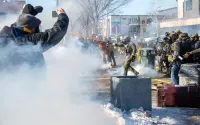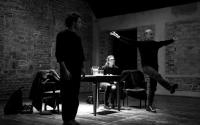5 September 2007Yahoo! NewsJane Sutton
The U.S. military is building a mobile courtroom complex on an unused runway at the Guantanamo Bay naval base and plans to be ready by March to conduct as many as three terrorism trials at a time.
The $10 million project will add two new courtrooms to the existing one, which is being fitted with a new computer projection system to display evidence for the war crimes tribunals set up to try suspected al Qaeda operatives held at the U.S. naval base in eastern Cuba.
"It's projected for an early spring completion," Rear Adm. Mark Buzby, who took command of the Guantanamo detention operation in May, told journalists visiting the base on Wednesday.
Pentagon officials have said they plan to try as many as 80 of the 355 Guantanamo prisoners on war crimes charges, including Khalid Sheikh Mohammed, whom the U.S. military said has confessed to plotting the September 11, 2001, attacks that killed nearly 3,000 people in the United States.
He is one of 14 "high-value" prisoners sent to Guantanamo last year from secret CIA prisons.
So far, Australian former prisoner David Hicks is the only person convicted in the Guantanamo tribunals, but he avoided a trial by accepting a plea deal that limited his sentence to nine months in prison.
Hicks pleaded guilty in March to providing material support for terrorism and was sent home to Australia to serve his sentence.
Efforts to try other Guantanamo prisoners in the tribunals, formally known as "commissions," are stalled in legal appeals. They have been condemned by human rights groups and by military and civilian lawyers for the prisoners, especially for the potential use of evidence obtained through coercion.
Critics call the tribunals an ad hoc legal system that follows neither U.S. military nor civilian law, nor the international laws of war established under various treaties.
Rows of khaki tents have sprung up on the old runway in front of the current court building and are being transformed into the temporary court complex ready to accommodate three simultaneous trials as soon as the appeals are resolved.
"What we don't want to do is have the process waiting on the facility to be constructed, so we're getting the facility in place, having it ready to go," Buzby said.
He described the complex as "expeditionary."
"It's not there to stay. It's there to come, do its mission and when the commissions are complete, whenever that is, it'll all go away, pack up the tents. Nothing will be there," Buzby said.
He said he did not know whether prosecutors would seek to try the "high-value" prisoners first if the courts allow the tribunals to go forward.
"I really don't know what the docket looks like," he said.






